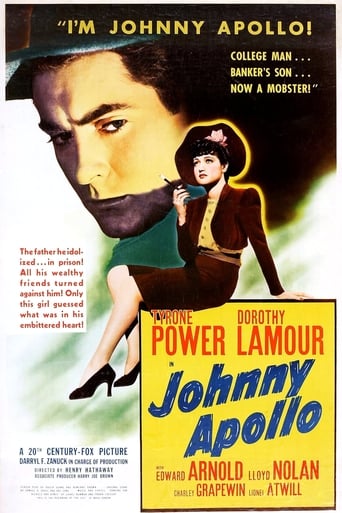edwagreen
Definitely one of the best gangster movies ever made. As the alcoholic attorney, Charley Grapewin, so memorable as Uncle Henry in "Wizard of Oz," Dorothy Lamour's complete change of pace from the 'Road' pictures to a moll, Edward Arnold, as the father who did wrong and Lloyd Nolan, as a slick gangster, make for an outstanding picture.When Arnold, a stockbroker, goes off to prison for embezzlement, his son, an able Tyrone Power, gets involved with gangsters in order to get his father out on parole. It is a terrific plot with those phenomenal performances. Lamour so aptly sings Beginning of the End. How appropriate that was.A grand story dealing with high collar crime and thugs in general. Interesting to note the deals that can be worked out. The best deal is to capture this worthy 1940 film.
JLRMovieReviews
Tyrone Power is Johnny Apollo, or is he? His character's name is Robert Cain, Jr. So how does he become Johnny Apollo? Edward Arnold, in one of his best performances ever, is Tyrone's father and a stockbroker, who gets in trouble when he embezzles his clients' money. Early on, they have a very heated exchange, and I've never seen Tyrone give such an understated and sincere performance as in that scene and in this whole movie. I was very impressed with Tyrone in this movie and with the movie itself, too. I already knew Edward Arnold was a great character actor before I re-watched this film. (I had not seen this in over 10 years.) Dorothy Lamour is good, too, but her songs in this movie were really unnecessary. I hate to say anything negative about sweet Dorothy, but she doesn't have much of a singing voice. Or, maybe those songs just got on my nerves. If it weren't for those songs, I'd give this more than an 8.Back to Ty. He tries to get a job, with his real name. No go! No one will hire him. So, he changes it to something else (not Apollo) and in the process gets fired for lying about it. By the by, he meets Lloyd Nolan who is an ex-con who makes him wise to getting ahead. Feeling somewhat poetic and/or allegorical in the process, this is probably "the best little crime drama you've never heard of," and has somehow fallen between the cracks and been overshadowed by more classic film noirs. Discover "Johnny Apollo" today.
jimddddd
"Johnny Apollo" is a better than average film for 1940, and it's worth watching if for no other reason than a four-minute segment in which sultry Dorothy Lamour, all dark eyes and pouty lips, sings "This Is the Beginning of the End" in a stunning, torchy alto. The song was a 1952 hit for singer Don Cornell, but his version pales beside Lamour's soulful rendition here. Her role as "Lucky" completely trumps her best known role as a foil for Hope & Crosby in the Road pictures. I have a whole new respect for her now as a singer, an artist and a sex symbol.
bmacv
Tyrone Power plays privileged young man Bob Cain, Jr., who adopts the nom de guerre Johnny Apollo when he takes to a life of crime. (Incidentally, this movie thus kicks off a string of at least a dozen crime stories of the ‘40s and ‘50s named Johnny Something-Or-Other: Eager, O'Clock, Stool Pigeon....) Power chooses crime to spite his father (Edward Arnold) by emulating his dog-eat-dog ethics, for financial tycoon Arnold has been sent to prison for embezzlement, causing a rift between the generations. After Power's initial snit over Dad's letting him down, his attempts to secure him an early parole lead, though `connected' shantoozie Dorothy Lamour, to the underworld. The muscles he developed rowing crew in the Ivy League stand him in good stead as muscle in the mob, for soon he becomes a trusted lieutenant in Lloyd Nolan's crime family (plausibility is not the movie's long suit). But Pop (who has reclaimed his spiritual center in the Big House by welding boilers) disowns his namesake when he learns of his new line of work. In due time, of course, Power ends up behind those bars as well. But that's far from the end of the tale....The plot of Johnny Apollo, a major production, takes a few turns too many but manages to keep a just-passable amount of credibility. Though Power, in the lead, stays less than persuasive as a menacing mobster – he's too much of a pretty-boy, and lacks the acting resources to turn himself into a pretty-boy psychopath – the rest of the cast compensates. Predictably, Arnold is good, as is, in the role of a mob mouthpiece with a weakness for Scotch-and-milk, Charlie Grapewin (whose first film credit falls in the last year of the 19th Century!); the two seem to be vying for title of America's sweetheart, old-codger division. Best of all is Lamour, with her sad eyes and fetching pout, who leaves an impression here of a skilled actress, more than she managed in all the Hope-Crosby `Road' pictures put together.Direction is by Henry Hathaway, an uneven craftsman who nonetheless rose to the occasion for a handful of movies; this can be counted among his stronger efforts, along with The Dark Corner, Kiss of Death, Fourteen Hours and Niagara. But Johnny Apollo cleaves more closely to the crime melodramas of the previous decade than to the unsentimental and ambiguous style soon to come. But, in it, one can nonetheless sense – particularly in its heavily shaded photography – the birth pangs of film noir, struggling to come into the world.


